Boyle J.A. The Cambridge History of Iran, Volume 5: The Saljuq and Mongol Periods
Подождите немного. Документ загружается.

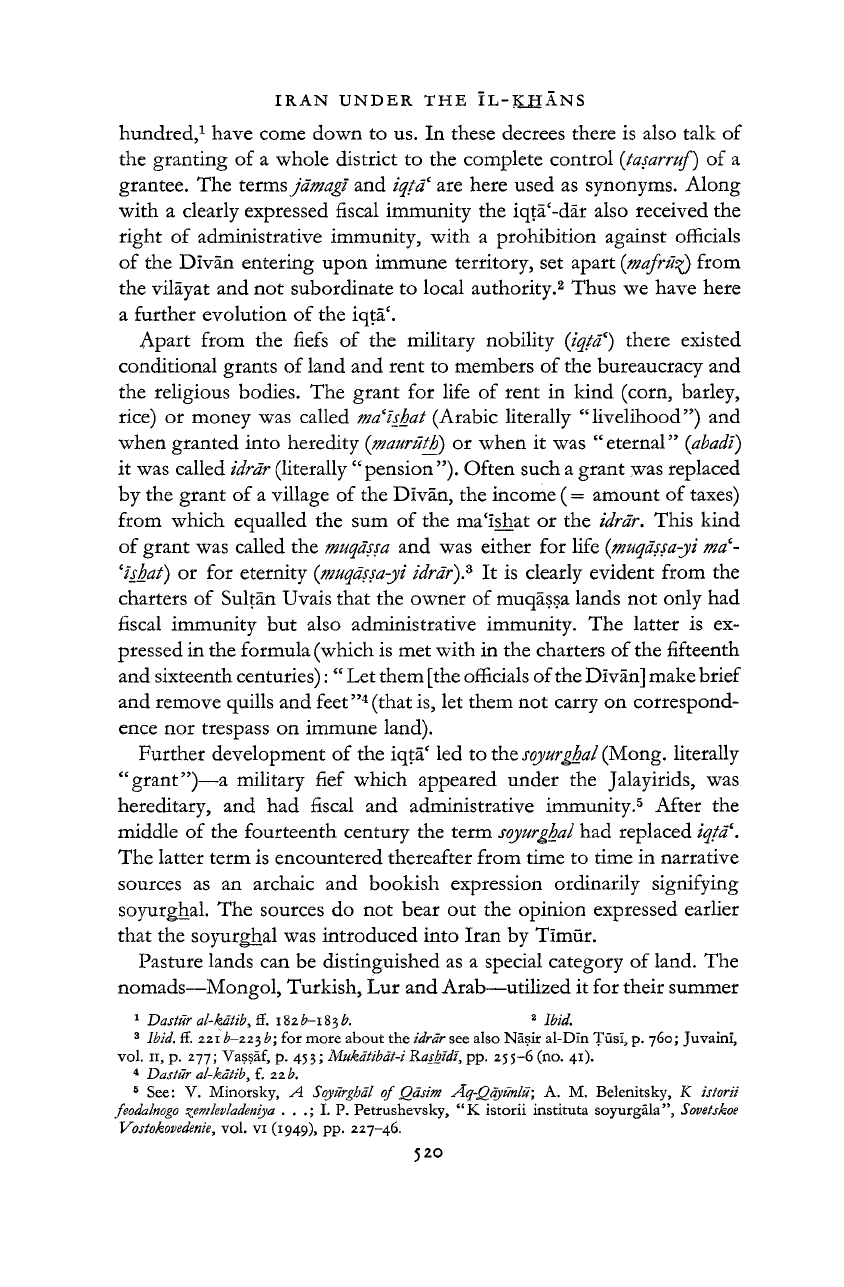
IRAN UNDER THE ÎL-KHANS
520
hundred,
1
have come down to us. In these decrees there is also talk of
the granting of a whole district to the complete control {tasarruf) of a
grantee. The terms
jâmagî and
iqtâ
<
՝
are here used as synonyms. Along
with a clearly expressed fiscal immunity the iqta'-dar also received the
right of administrative immunity, with a prohibition against officials
of the
Divân entering upon immune territory, set apart
{mafru%)
from
the vilâyat and not subordinate to local authority.
2
Thus we have here
a further evolution of the iqtâ
c
.
Apart from the fiefs of the military nobility (Jqta
6
) there existed
conditional grants of land and rent to members of the bureaucracy and
the religious bodies. The grant for life of rent in kind (corn, barley,
rice) or money was called
ma'îşhat (Arabic literally " livelihood") and
when granted into heredity
{maurütB)
or when it was "eternal" {abadı)
it was called
idrar
(literally "pension"). Often such a grant was replaced
by the grant of a village of the Divân, the income ( = amount of taxes)
from which equalled the sum of the ma'Ishat or the
idrar. This kind
of grant was called the
muqassa
and was either for life
{muqâşşa-yi
ma՝-
c
։shat)
or for eternity
{muqâşşa-yi
idrar)? It is clearly evident from the
charters of Sultân Uvais that the owner of muqassa lands not only had
fiscal immunity but also administrative immunity. The latter is ex-
pressed in the formula (which is met with in the charters of the fifteenth
and sixteenth centuries): " Let them [the officials of the
Divân] make brief
and remove quills and feet"
4
(that is, let them not carry on correspond-
ence nor trespass on immune land).
Further development of the iqta* led to the
soyurghal
(Mong. literally
"grant")—a military fief which appeared under the Jalayirids, was
hereditary, and had fiscal and administrative immunity.
5
After the
middle of the fourteenth century the term
soyurghal
had replaced iqta.
The latter term is encountered thereafter from time to time in narrative
sources as an archaic and bookish expression ordinarily signifying
soyur
ghal. The sources do not bear out the opinion expressed earlier
that the soyur
ghal was introduced into Iran by Timur.
Pasture lands can be distinguished as a special category of land. The
nomads—Mongol, Turkish, Lur and Arab—utilized it for their summer
1
Dastür al-kâtib, ff. 182 b-i
83
b.
2
Ibid.
3
Ibid. ff. 221
b-22$b;
for more about the idrar see also Naşir al-DIn Tüsî, p. 760; Juvaini,
vol.
11, p. 277; Vaşşâf, p. 453; Mukâtibât-i Raşhîdz, pp. 255-6 (no. 41).
4
Dastür al-kâtib, f.
22
b.
5
See: V. Minorsky, A. Soyurghal of Qasim Aq-Qâyünlü\ A. M. Belenitsky, K istorii
feodalnogo %emlevladeniya
. . .; I. P. Petrushevsky, "K istorii instituta soyurgâia", Sovetskoe
Vostokovedenie,
vol. vi (1949), pp. 227-46.
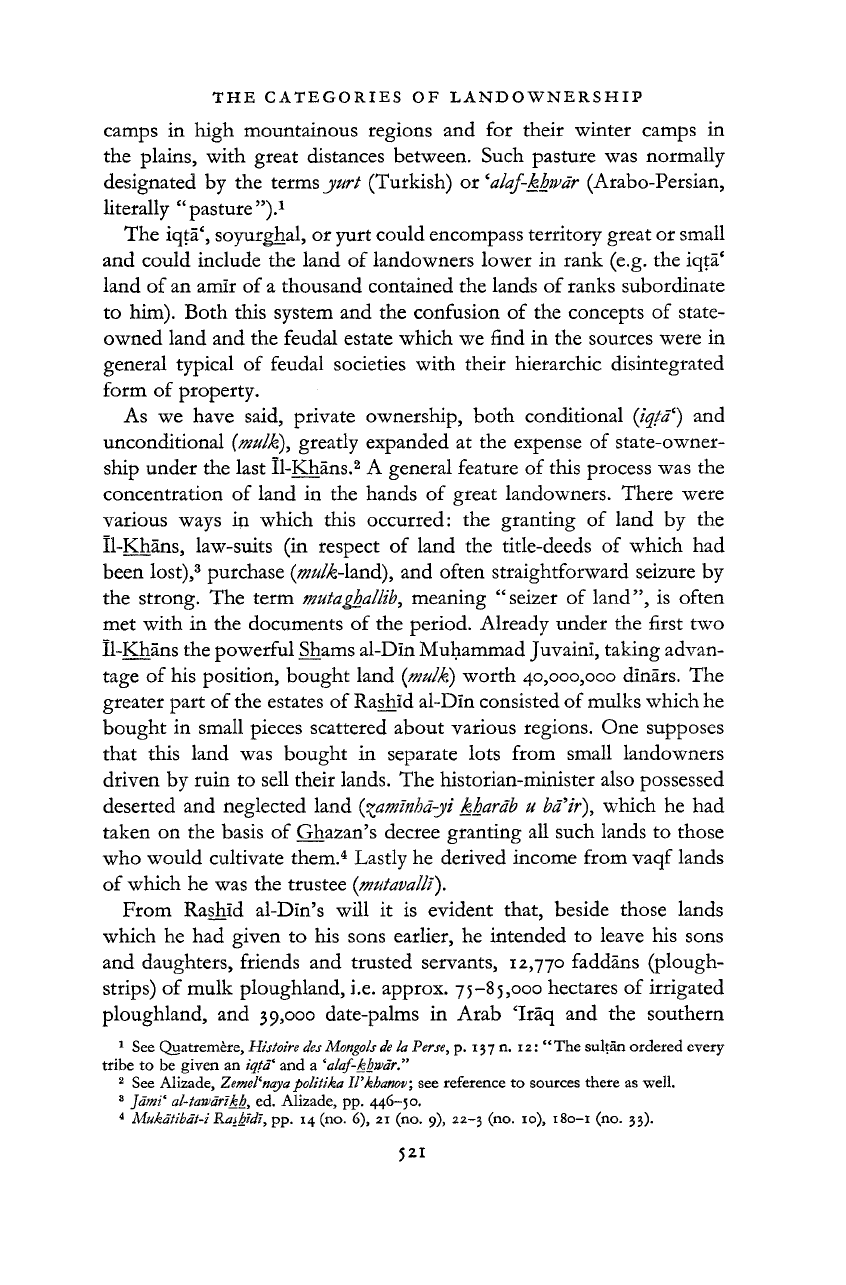
THE CATEGORIES OF LANDOWNERS HIP
521
camps in high mountainous regions and for their winter camps in
the plains, with great distances between. Such pasture was normally
designated by the terms yurt (Turkish) or 'alaj-khvdr (Arabo-Persian,
literally "pasture").
1
The iqta', soyurghal, or yurt could encompass territory great or small
and could include the land of landowners lower in rank (e.g. the iqta*
land of an amir of a thousand contained the lands of ranks subordinate
to him). Both this system and the confusion of the concepts of state-
owned land and the feudal estate which we find in the sources were in
general typical of feudal societies with their hierarchic disintegrated
form of property.
As we have said, private ownership, both conditional (iqtd
c
) and
unconditional (muik), greatly expanded at the expense of state-owner-
ship under the last Il-Khans.
2
A general feature of this process was the
concentration of land in the hands of great landowners. There were
various ways in which this occurred: the granting of land by the
Il-Khans, law-suits (in respect of land the title-deeds of which had
been lost),
3
purchase (^////fe-land), and often straightforward seizure by
the strong. The term mutaghallib, meaning " seizer of land", is often
met with in the documents of the period. Already under the first two
Il-Khans the powerful Shams al-Dln Muhammad Juvaini, taking advan-
tage of his position, bought land (wulk) worth 40,000,000 dinars. The
greater part of the estates of Rashid al-Dln consisted of mulks which he
bought in small pieces scattered about various regions. One supposes
that this land was bought in separate lots from small landowners
driven by ruin to sell their lands. The historian-minister also possessed
deserted and neglected land
(gaminhd-yi
khardb u bd'ir), which he had
taken on the basis of Ghazan's decree granting all such lands to those
who would cultivate them.
4
Lastly he derived income from vaqf lands
of which he was the trustee (mutavalli).
From Rashid al-Din's will it is evident that, beside those lands
which he had given to his sons earlier, he intended to leave his sons
and daughters, friends and trusted servants, 12,770 faddans (plough-
strips) of mulk ploughland, i.e. approx. 75-85,000 hectares of irrigated
ploughland, and 39,000 date-palms in Arab "Iraq and the southern
1
See Quatremere, Histoire
des Mongols de
la Perse, p. 137 n. 12: "The sultan ordered every
tribe to be given an iqtd
i
and a 'alaf-khwdr"
2
See Alizade,
ZemeVnaya
politika Wkhanov\ see reference to sources there as well.
8
J
ami*
al-tawdrtkh, ed. Alizade, pp. 446-50.
4
Mukdtibdt-i Raihtdi, pp. 14 (no. 6), 21 (no. 9), 22-3 (no. 10), 180-1 (no. 33).
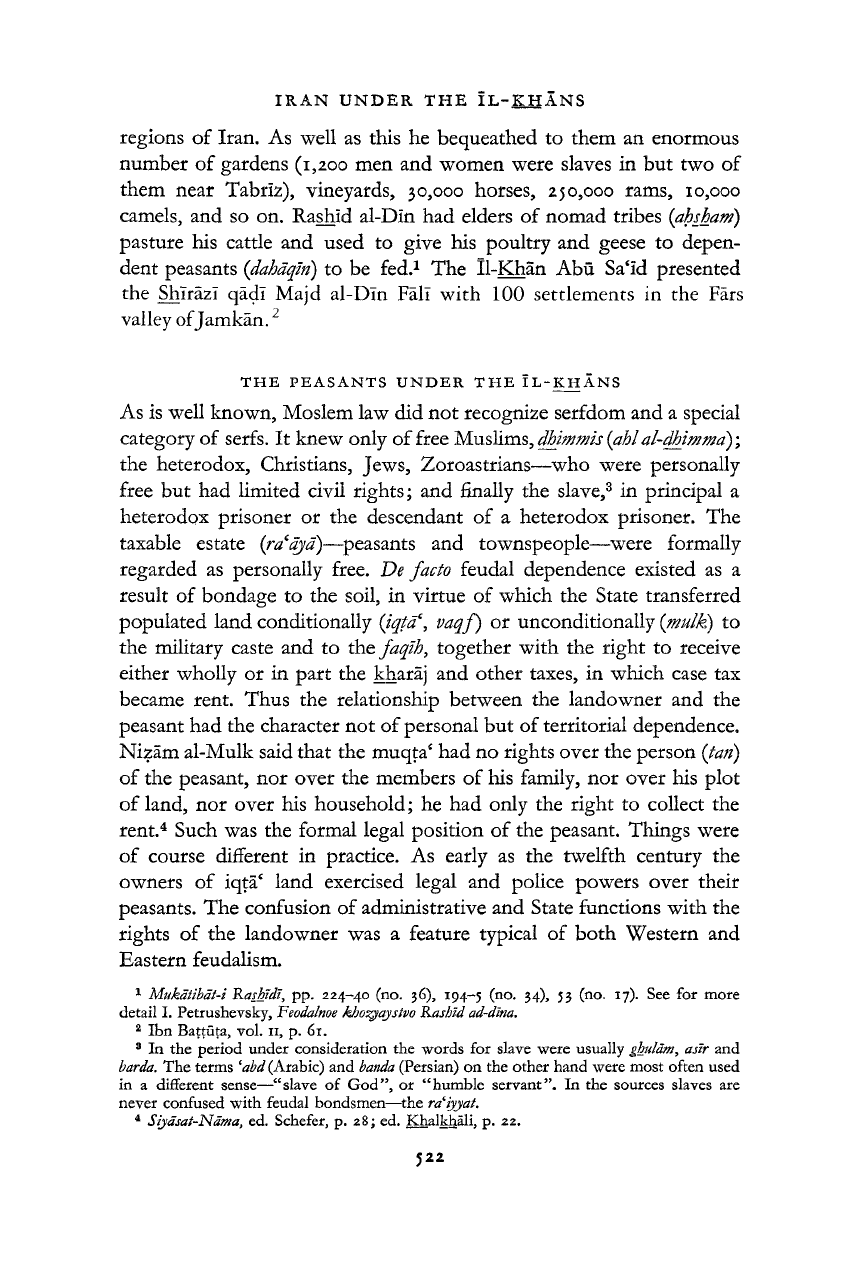
IRAN UNDER THE IL-KHANS
522
regions of Iran. As well as this he bequeathed to them an enormous
number of gardens (1,200 men and women were slaves in but two of
them near Tabriz), vineyards, 30,000 horses, 250,000 rams, 10,000
camels, and so on. Rashid al-Dln had elders of nomad tribes
{ahsham)
pasture his cattle and used to give his poultry and geese to depen-
dent peasants
{dahdqiri)
to be fed.
1
The Il-Khan Abu. Sa'id presented
the Shlrazi qadl Majd al-Dln Fall with
100
settlements in the Fars
valley ofjamkan.
2
THE PEASANTS UNDER THE IL-KHANS
As is well known, Moslem law did not recognize serfdom and a special
category of serfs. It knew only of free Muslims,
dhimmis
{ahlal-dhimma);
the heterodox, Christians, Jews, Zoroastrians—who were personally
free but had limited civil rights; and finally the slave,
3
in principal a
heterodox prisoner or the descendant of a heterodox prisoner. The
taxable estate {ra'aya)—peasants and townspeople—were formally
regarded as personally free. De facto feudal dependence existed as a
result of bondage to the soil, in virtue of which the State transferred
populated land conditionally {iqta\ vaqf) or unconditionally
{muik)
to
the military caste and to the faqih, together with the right to receive
either wholly or in part the kharaj and other taxes, in which case tax
became rent. Thus the relationship between the landowner and the
peasant had the character not of personal but of territorial dependence.
Nizam al-Mulk said that the muqta' had no rights over the person {tan)
of the peasant, nor over the members of his family, nor over his plot
of land, nor over his household; he had only the right to collect the
rent.
4
Such was the formal legal position of the peasant. Things were
of course different in practice. As early as the twelfth century the
owners of iqta
c
land exercised legal and police powers over their
peasants. The confusion of administrative and State functions with the
rights of the landowner was a feature typical of both Western and
Eastern feudalism.
1
Mukatibat-i Rashidi, pp. 224-40 (no. 36), 194-5 (no. 34), 53 (no. 17). See for more
detail I. Petrushevsky,
Feodalnoe khozyaystvo
Rashid
ad-dina.
2
Ibn Battuta, vol. 11, p. 61.
8
In the period under consideration the words for slave were usually
gbu/dm,
aslr and
barda. The terms
l
abd (Arabic) and
banda
(Persian) on the other hand were most often used
in a different sense—"slave of God", or "humble servant". In the sources slaves are
never confused with feudal bondsmen—the
ra^iyyat.
4
Siydsat-Ndma, ed. Schefer, p. 28; ed. Khalkhali. p. 22.
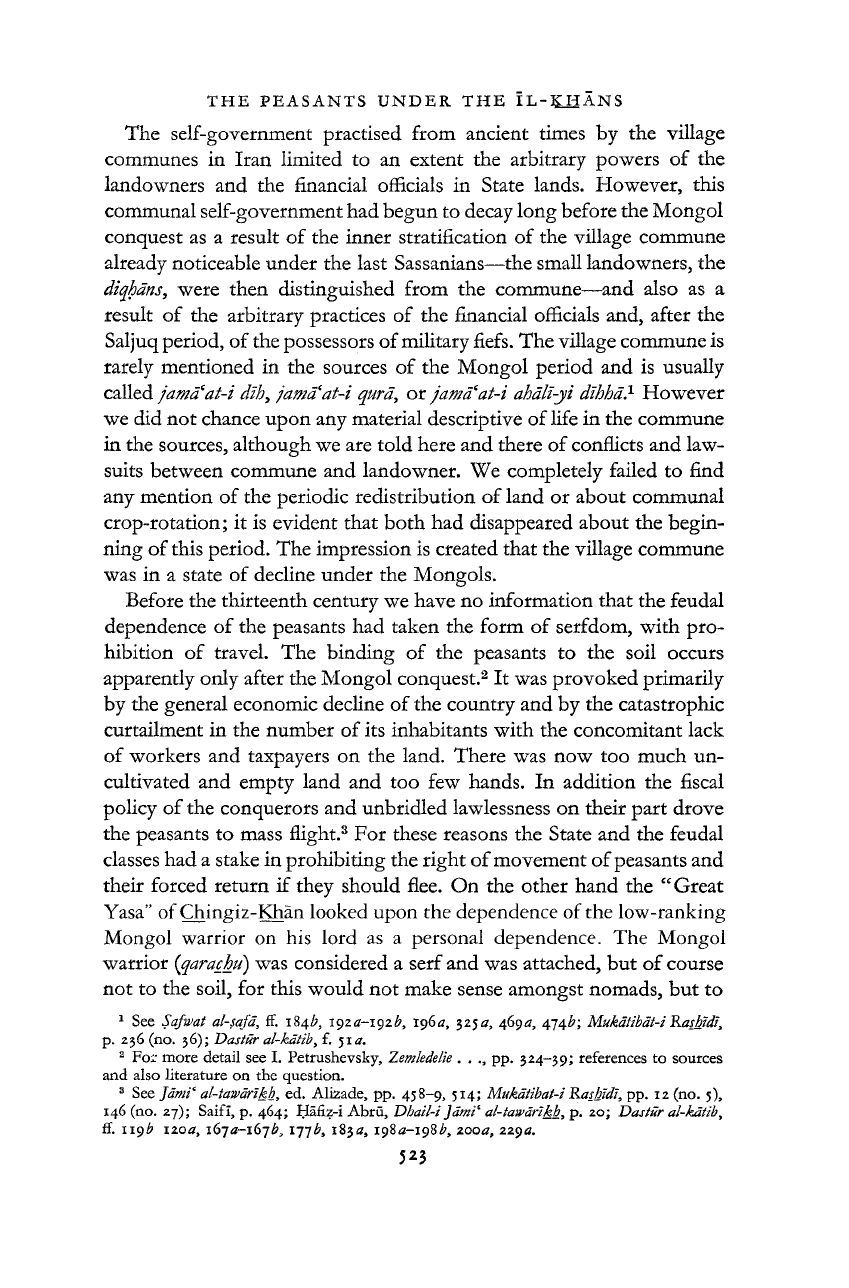
THE PEASANTS UNDER THE ÏL-&HANS
The self-government practised from ancient times by the village
communes in Iran limited to an extent the arbitrary powers of the
landowners and the financial officials in State lands. However, this
communal self-government had begun to decay long before the Mongol
conquest as a result of the inner stratification of the village commune
already noticeable under the last Sassanians—the small landowners, the
diqhâns, were then distinguished from the commune—and also as a
result of the arbitrary practices of the financial officials and, after the
Saljuq period, of the possessors of military fiefs. The village commune is
rarely mentioned in the sources of the Mongol period and is usually
called jamâ'at-i
dïh>
jamaat-i qurâ
y
or jamâ'at-i
ahâlï֊yi
dïhhâ.
1
However
we did not chance upon any material descriptive of life in the commune
in the sources, although we are told here and there of conflicts and law-
suits between commune and landowner. We completely failed to find
any mention of the periodic redistribution of land or about communal
crop-rotation; it is evident that both had disappeared about the begin-
ning of this period. The impression is created that the village commune
was in a state of decline under the Mongols.
Before the thirteenth century we have no information that the feudal
dependence of the peasants had taken the form of serfdom, with pro-
hibition of travel. The binding of the peasants to the soil occurs
apparently only after the Mongol conquest.
2
It was provoked primarily
by the general economic decline of the country and by the catastrophic
curtailment in the number of its inhabitants with the concomitant lack
of workers and taxpayers on the land. There was now too much un-
cultivated and empty land and too few hands. In addition the fiscal
policy of the conquerors and unbridled lawlessness on their part drove
the peasants to mass flight.
3
For these reasons the State and the feudal
classes had a stake in prohibiting the right of movement of peasants and
their forced return if they should flee. On the other hand the "Great
Yasa" of Chingiz-Khan looked upon the dependence of the low-ranking
Mongol warrior on his lord as a personal dependence. The Mongol
warrior
(qaraçhu)
was considered a serf and was attached, but of course
not to the soil, for this would not make sense amongst nomads, but to
1
See Safwat al-safâ, ff. 184^, 192^-192^, 1960, 3250, 4690, 474^; Mukâtibât-i Rashïdï,
p.
236 (no. 36); Dastûr al-kâtib, f. 51^.
2
For more detail see I. Petrushevsky, Zemledelie . , pp. 324-39; references to sources
and also literature on the question.
8
See Jâmi' al-tawârikh, ed. Alizade, pp. 458-9, 514; Mukàtibat-i
Kashidt^
pp. 12 (no. 5),
146 (no. 27); Saifï, p. 464; Hâfiz-i Abrû, Dhail-i ]âmi
c
al-tawârïkb
։
p. 20; Dastûr
al-kàtib^
ff.
119^
i2o#,
iGja-iSjb, 177b, 1830, 198^-198^, 200*2, 229*.
J23
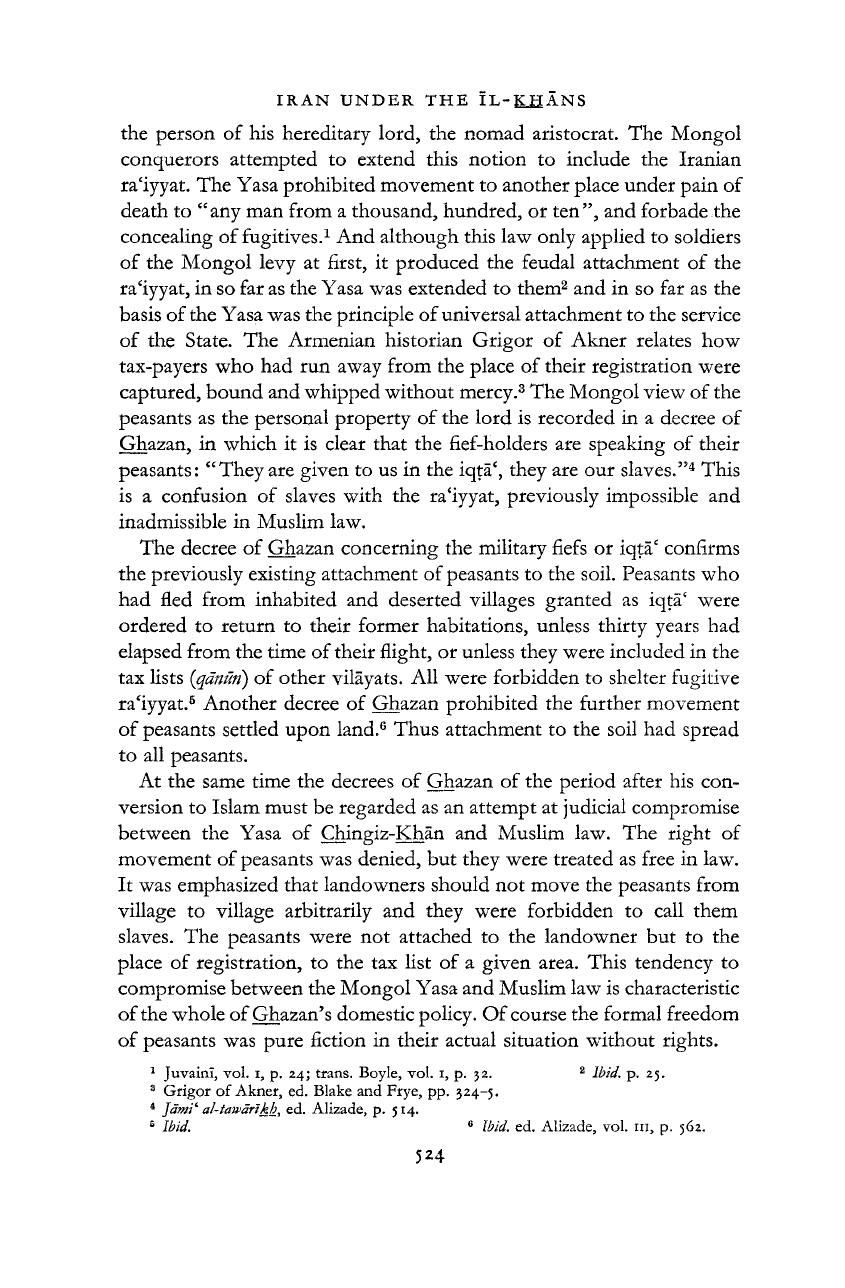
IRAN UNDER THE IL-KHANS
524
the person of his hereditary lord, the nomad aristocrat. The Mongol
conquerors attempted to extend this notion to include the Iranian
ra'iyyat. The Yasa prohibited movement to another place under pain of
death to "any man from a thousand, hundred, or ten", and forbade the
concealing of fugitives.
1
And although this law only applied to soldiers
of the Mongol levy at first, it produced the feudal attachment of the
ra'iyyat, in so far as the Yasa was extended to them
2
and in so far as the
basis of the Yasa was the principle of universal attachment to the service
of the State. The Armenian historian Grigor of Akner relates how
tax-payers who had run away from the place of their registration were
captured, bound and whipped without mercy.
3
The Mongol view of the
peasants as the personal property of the lord is recorded in a decree of
Ghazan, in which it is clear that the fief-holders are speaking of their
peasants: "They are given to us in the iqta', they are our slaves."
4
This
is a confusion of slaves with the ra'iyyat, previously impossible and
inadmissible in Muslim law.
The decree of Ghazan concerning the military fiefs or iqta
c
confirms
the previously existing attachment of peasants to the soil. Peasants who
had fled from inhabited and deserted villages granted as iqta' were
ordered to return to their former habitations, unless thirty years had
elapsed from the time of their flight, or unless they were included in the
tax lists
(qdnuri)
of other vilayats. All were forbidden to shelter fugitive
ra'iyyat.
5
Another decree of Ghazan prohibited the further movement
of peasants settled upon land.
6
Thus attachment to the soil had spread
to all peasants.
At the same time the decrees of Ghazan of the period after his con-
version to Islam must be regarded as an attempt at judicial compromise
between the Yasa of Chingiz-
Khan and Muslim law. The right of
movement of peasants was denied, but they were treated as free in law.
It was emphasized that landowners should not move the peasants from
village to village arbitrarily and they were forbidden to call them
slaves. The peasants were not attached to the landowner but to the
place of registration, to the tax list of a given area. This tendency to
compromise between the Mongol Yasa and Muslim law is characteristic
of the whole of Ghazan's domestic policy. Of course the formal freedom
of peasants was pure fiction in their actual situation without rights.
1
Juvaini, vol. i, p. 24; trans. Boyle, vol. 1, p. 32.
2
Ibid, p. 25.
3
Grigor of Akner, ed. Blake and Frye, pp. 324-5.
4
J ami
1
al-tawdrtkh, ed. Alizade, p. 514.
5
Ibid,
6
Ibid. ed. Alizade, vol. in, p. 562.
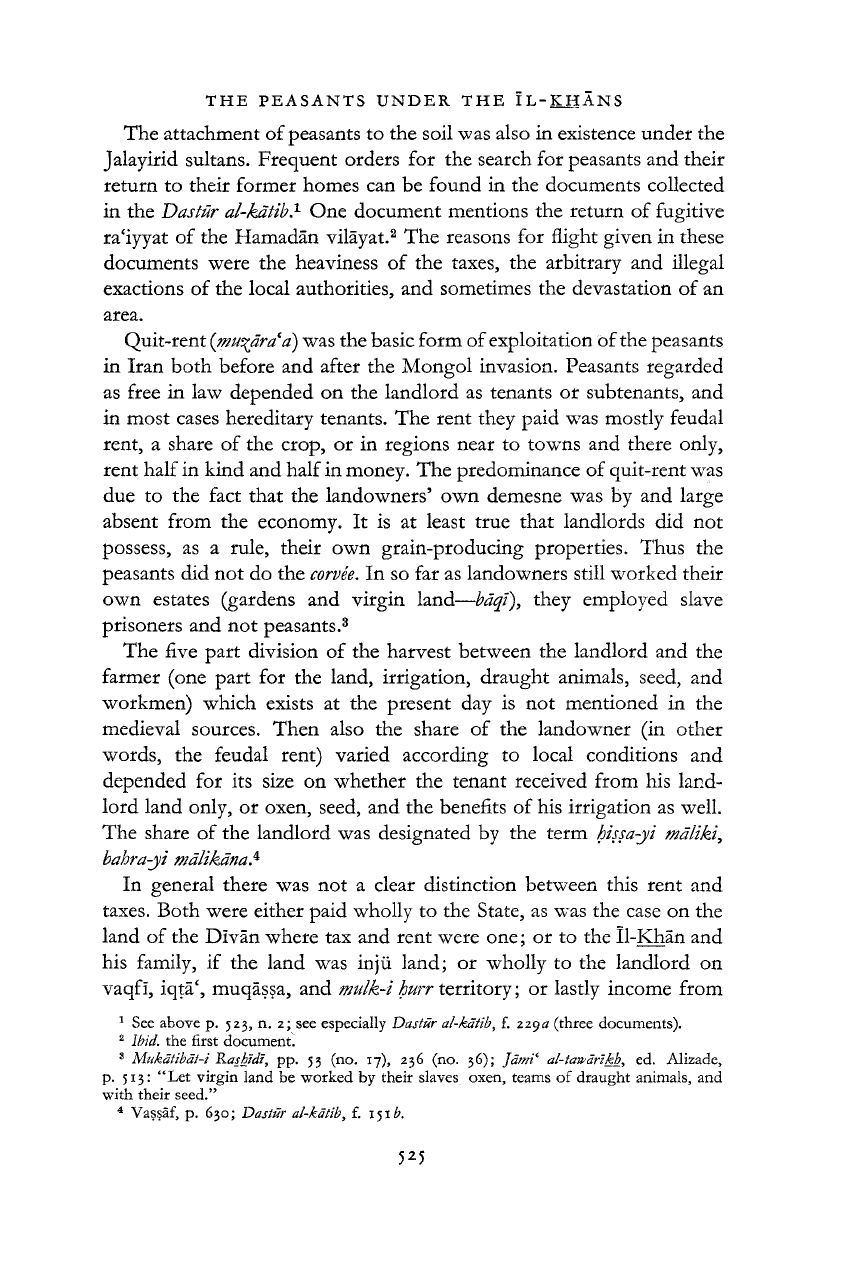
THE PEASANTS UNDER THE IL֊KHANS
525
The attachment of peasants to the soil was also in existence under the
Jalayirid sultans. Frequent orders for the search for peasants and their
return to their former homes can be found in the documents collected
in the Das fur al-kdtib.
1
One document mentions the return of fugitive
ra'iyyat of the Hamadan vilayat.
2
The reasons for flight given in these
documents were the heaviness of the taxes, the arbitrary and illegal
exactions of the local authorities, and sometimes the devastation of an
area.
Quit-rent
{mu^ara^d)
was the basic form of exploitation of the peasants
in Iran both before and after the Mongol invasion. Peasants regarded
as free in law depended on the landlord as tenants or subtenants, and
in most cases hereditary tenants. The rent they paid was mostly feudal
rent, a share of the crop, or in regions near to towns and there only,
rent half in kind and half in money. The predominance of quit-rent was
due to the fact that the landowners' own demesne was by and large
absent from the economy. It is at least true that landlords did not
possess, as a rule, their own grain-producing properties. Thus the
peasants did not do the
corvee.
In so far as landowners still worked their
own estates (gardens and virgin land—bdqi\ they employed slave
prisoners and not peasants.
3
The five part division of the harvest between the landlord and the
farmer (one part for the land, irrigation, draught animals, seed, and
workmen) which exists at the present day is not mentioned in the
medieval sources. Then also the share of the landowner (in other
words, the feudal rent) varied according to local conditions and
depended for its size on whether the tenant received from his land-
lord land only, or oxen, seed, and the benefits of his irrigation as well.
The share of the landlord was designated by the term hissa-ji mdliki,
bahra-yi
mdlikdna^
In general there was not a clear distinction between this rent and
taxes.
Both were either paid wholly to the State, as was the case on the
land of the Divan where tax and rent were one; or to the Il-Khan and
his family, if the land was injii land; or wholly to the landlord on
vaqfi, iqta', muqassa, and
mulk~i
hurr territory; or lastly income from
1
See above p. 523, n. 2; see especially Dastur
al-kdtibľ,
f. 2290 (three documents).
2
Ibid, the first document.
8
Mukdtibdi-i Rashldz, pp. 53 (no. 17), 236 (no. 36); J ami' al-tawdnkh, ed. Alizade,
p.
513: "Let virgin land be worked by their slaves oxen, teams of draught animals, and
with their seed."
4
Vassaf, p. 630; Dastur al-kdtib, f. 151b.
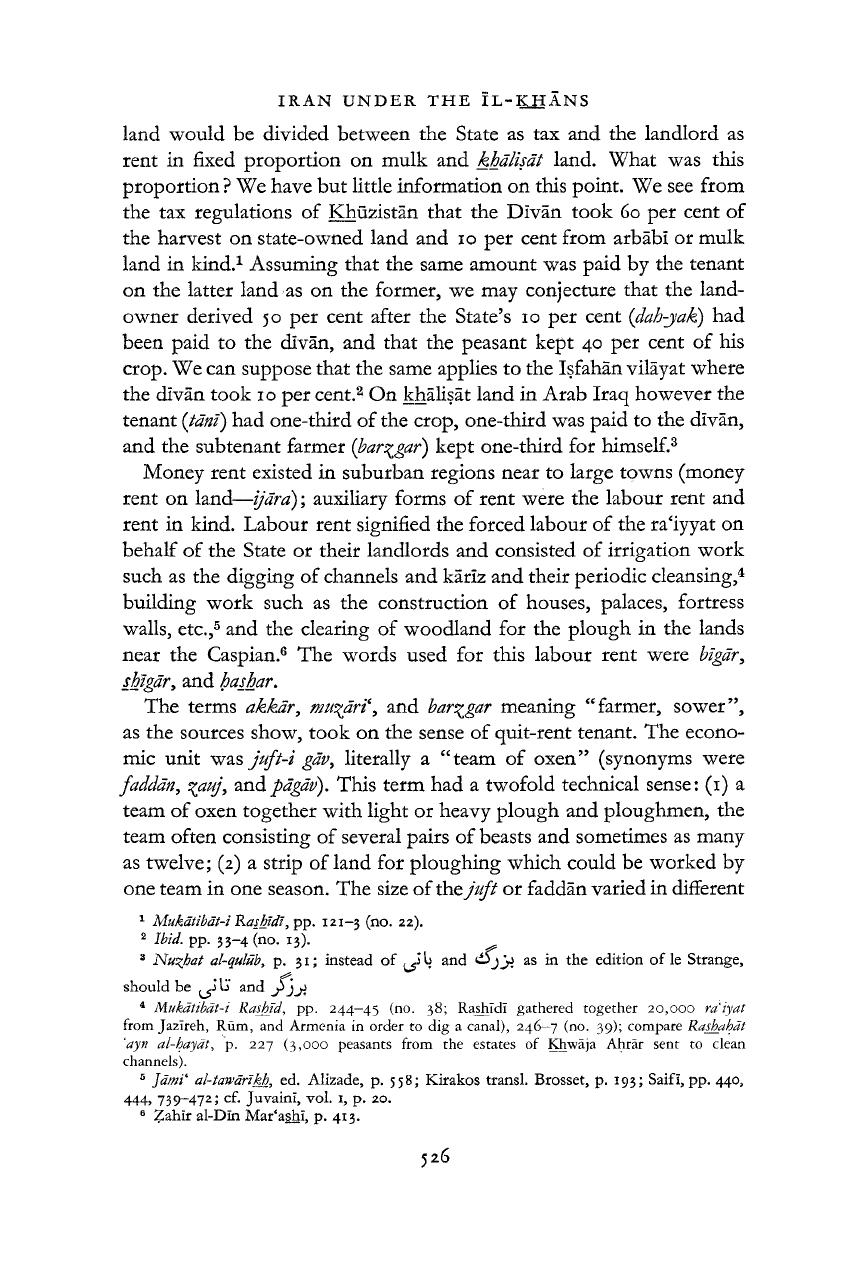
IRAN UNDER THE IL-KHANS
526
land would be divided between the State as tax and the landlord as
rent in fixed proportion on mulk and khdlisdt land. What was this
proportion
?
We have but little information on this point. We see from
the tax regulations of Khuzistan that the Divan took 60 per cent of
the harvest on state-owned land and 10 per cent from arbabi or mulk
land in kind.
1
Assuming that the same amount was paid by the tenant
on the latter land as on the former, we may conjecture that the land-
owner derived 50 per cent after the State's 10 per cent (dah-jak) had
been paid to the divan, and that the peasant kept 40 per cent of his
crop.
We can suppose that the same applies to the Isfahan vilayat where
the divan took 10 per cent.
2
On khalisat land in Arab Iraq however the
tenant {tdni) had one-third of the crop, one-third was paid to the divan,
and the subtenant farmer
(bar^gar)
kept one-third for himself.
3
Money rent existed in suburban regions near to large towns (money
rent on land—ijdra); auxiliary forms of rent were the labour rent and
rent in kind. Labour rent signified the forced labour of the ra'iyyat on
behalf of the State or their landlords and consisted of irrigation work
such as the digging of channels and kariz and their periodic cleansing,
4
building work such as the construction of houses, palaces, fortress
walls,
etc.,
5
and the clearing of woodland for the plough in the lands
near the Caspian.
6
The words used for this labour rent were bigdr,
shigdr, and hashar.
The terms akkdr, mu%ari\ and bar^gar meaning "farmer, sower",
as the sources show, took on the sense of quit-rent tenant. The econo-
mic unit was juft-i gdv
y
literally a "team of oxen" (synonyms were
fadddn, ^auj
y
and
pdgdv).
This term had a twofold technical sense: (1) a
team of oxen together with light or heavy plough and ploughmen, the
team often consisting of several pairs of beasts and sometimes as many
as twelve; (2) a strip of land for ploughing which could be worked by
one team in one season. The size of the juft or faddan varied in different
1
Mukatibdt-i Rashzdt, pp. 121-3 (no. 22).
2
Ibid. pp. 33-4 (no. 13). ^
3
Nu^hat al-qulub, p. 31; instead of ^ U and <l5j j> as in the edition of le Strange,
should be and
4
Mukdtibdt-i Rasbid, pp. 244—45 (no. 38; Rashldl gathered together 20,000 raiyat
from Jazireh, Rum, and Armenia in order to dig a canal), 246—7 (no. 39); compare Rashahat
'ayn al-haydt, p. 227 (3,000 peasants from the estates of Khwaja Ahrar sent to clean
channels).
5
J
ami*
1
al-tawdrtkh, ed. Alizade, p. 558; Kirakos transl. Brosset, p. 193; Saifi, pp. 440,
444,
739-472; cf. Juvaini, vol. 1, p. 20.
6
£ahir al-DIn Mar'ashl, p. 413.
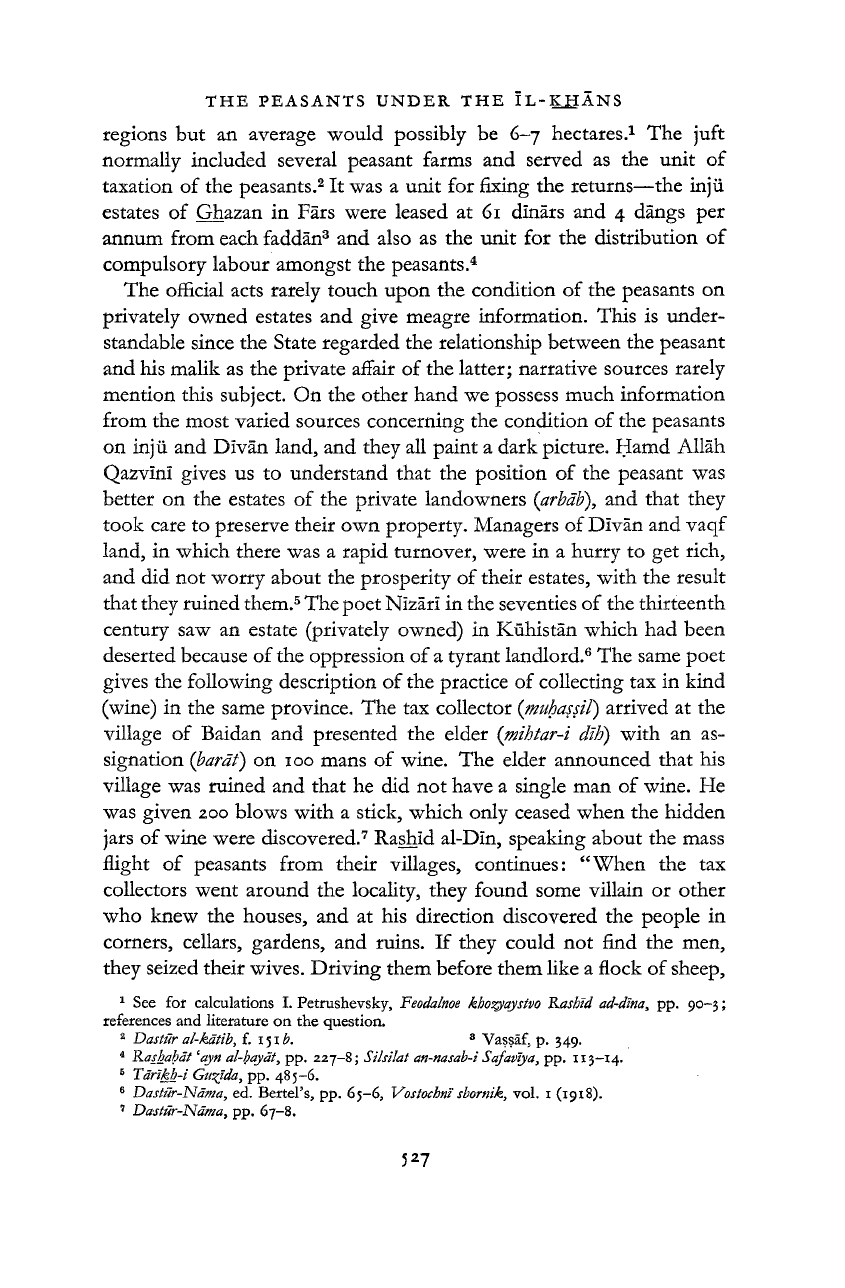
THE PEASANTS UNDER THE IL-KHANS
527
regions but an average would possibly be 6-7 hectares.
1
The juft
normally included several peasant farms and served as the unit of
taxation of the peasants.
2
It was a unit for fixing the returns—the inju
estates of Ghazan in Fars were leased at 61 dinars and 4 dangs per
annum from each faddan
3
and also as the unit for the distribution of
compulsory labour amongst the peasants.
4
The official acts rarely touch upon the condition of the peasants on
privately owned estates and give meagre information. This is under-
standable since the State regarded the relationship between the peasant
and his malik as the private affair of the latter; narrative sources rarely
mention this subject. On the other hand we possess much information
from the most varied sources concerning the condition of the peasants
on injii and Divan land, and they all paint a dark picture. Hamd Allah
Qazvlnl gives us to understand that the position of the peasant was
better on the estates of the private landowners (arbdb), and that they
took care to preserve their own property. Managers of Divan and vaqf
land, in which there was a rapid turnover, were in a hurry to get rich,
and did not worry about the prosperity of their estates, with the result
that they ruined them.
5
The poet Nlzarl in the seventies of the thirteenth
century saw an estate (privately owned) in Kuhistan which had been
deserted because of the oppression of a tyrant landlord,
6
The same poet
gives the following description of the practice of collecting tax in kind
(wine) in the same province. The tax collector
(muhassil)
arrived at the
village of Baidan and presented the elder {mihtar-i dih) with an as-
signation (bardt) on 100 mans of wine. The elder announced that his
village was ruined and that he did not have a single man of wine. He
was given 200 blows with a stick, which only ceased when the hidden
jars of wine were discovered.
7
Rashid al-Din, speaking about the mass
flight of peasants from their villages, continues: "When the tax
collectors went around the locality, they found some villain or other
who knew the houses, and at his direction discovered the people in
corners, cellars, gardens, and ruins. If they could not find the men,
they seized their wives. Driving them before them like a flock of sheep,
1
See for calculations I. Petrushevsky, Feodalnoe khosgaystvo Rashid ad-dina, pp. 90-3;
references and literature on the question.
2
Dastur al-kdtib) f. 151
8
Vassaf. p. 349.
4
Rashahdt
c
ayn al-haydt
y
pp. 227-8; Silsilat
an-nasab-i
Safaviya,
pp. 113-14.
5
Tdrikh-i Guftfda, pp. 485-6.
6
Dastur-Ndma, ed. BertePs, pp. 65-6,
Vostochni'
sbornik, vol. 1 (1918).
1
Dastur-Ndma, pp. 67-8.
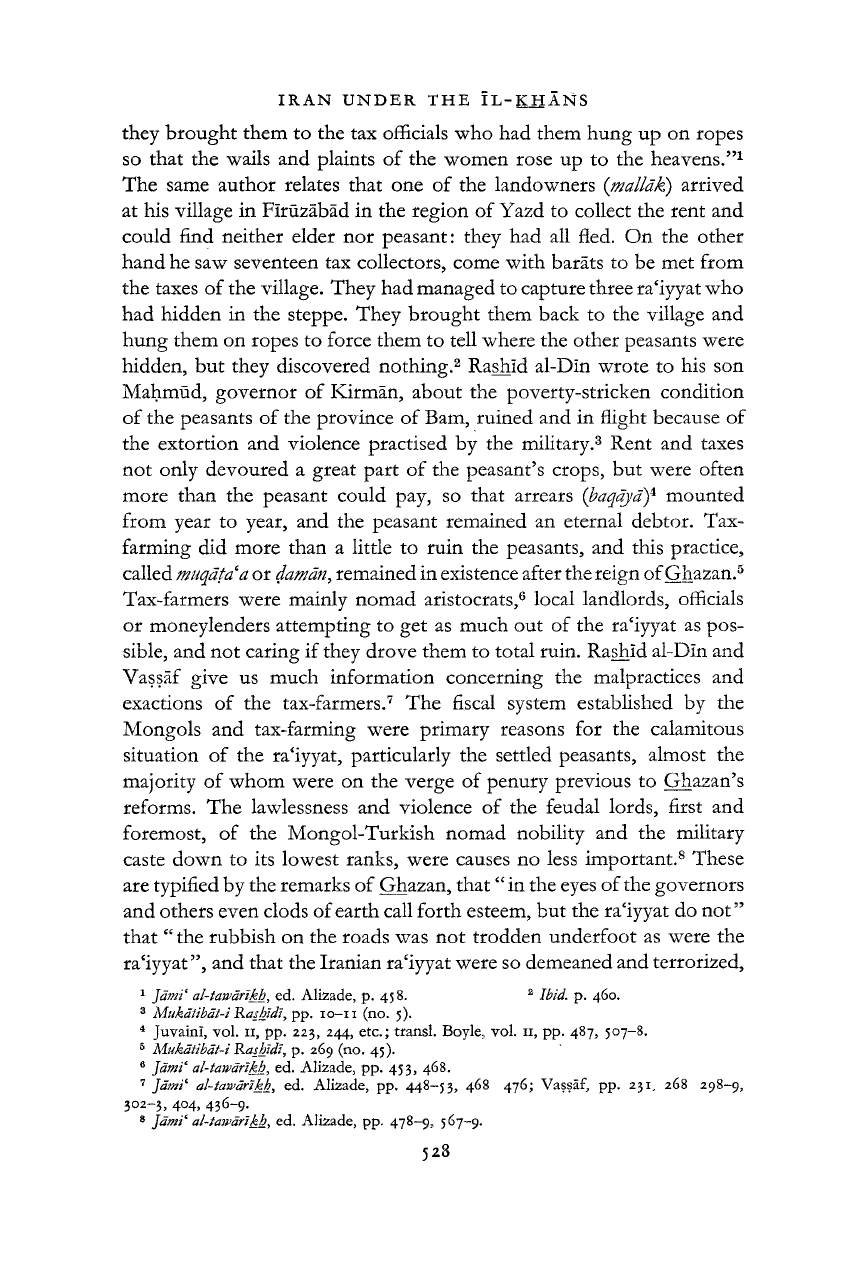
IRAN UNDER THE IL-KHANS
528
they brought them to the tax officials who had them hung up on ropes
so that the wails and plaints of the women rose up to the heavens."
1
The same author relates that one of the landowners (malldk) arrived
at his village in Flruzabad in the region of Yazd to collect the rent and
could find neither elder nor peasant: they had all fled. On the other
hand he saw seventeen tax collectors, come with barats to be met from
the taxes of the village. They had managed to capture three ra'iyyat who
had hidden in the steppe. They brought them back to the village and
hung them on ropes to force them to tell where the other peasants were
hidden, but they discovered nothing.
2
Rashid al-Dln wrote to his son
Mahmud, governor of Kirman, about the poverty-stricken condition
of the peasants of the province of Bam, ruined and in flight because of
the extortion and violence practised by the military.
3
Rent and taxes
not only devoured a great part of the peasant's crops, but were often
more than the peasant could pay, so that arrears (baqdjdy mounted
from year to year, and the peasant remained an eternal debtor. Tax-
farming did more than a little to ruin the peasants, and this practice,
called mtqdta'a or
daman,
remained in existence after the reign of Ghazan.
5
Tax-farmers were mainly nomad aristocrats,
6
local landlords, officials
or moneylenders attempting to get as much out of the ra'iyyat as pos-
sible, and not caring if they drove them to total ruin. Rashid al-Dln and
Vassaf give us much information concerning the malpractices and
exactions of the tax-farmers.
7
The fiscal system established by the
Mongols and tax-farming were primary reasons for the calamitous
situation of the ra'iyyat, particularly the settled peasants, almost the
majority of whom were on the verge of penury previous to Ghazan's
reforms. The lawlessness and violence of the feudal lords, first and
foremost, of the Mongol-Turkish nomad nobility and the military
caste down to its lowest ranks, were causes no less important.
8
These
are typified by the remarks of Ghazan, that" in the eyes of the governors
and others even clods of earth call forth esteem, but the ra'iyyat do not"
that " the rubbish on the roads was not trodden underfoot as were the
ra'iyyat", and that the Iranian ra'iyyat were so demeaned and terrorized,
1
]dmi
i
al-tan>drikk
y
ed. Alizade, p. 458.
2
Ibid. p. 460.
3
Mukdtibdt-i Rasbidl, pp. 10-11 (no. 5).
4
Juvaini, vol. 11, pp. 223, 244, etc.; transl. Boyle, vol. 11, pp. 487, 507-8.
5
Mukdtibdt-i
Rasbzdz,
p. 269 (no. 45).
6
J ami' al-tawarikh, ed. Alizade, pp. 453, 468.
7
J ami' al-tawdrzkh, ed. Alizade, pp. 448-53, 468 476; Vassaf, pp. 231. 268 298-9,
302-3,
404, 436-9-
8
J ami
1
al-tawarikh^
ed. Alizade, pp. 478-9, 567-9.
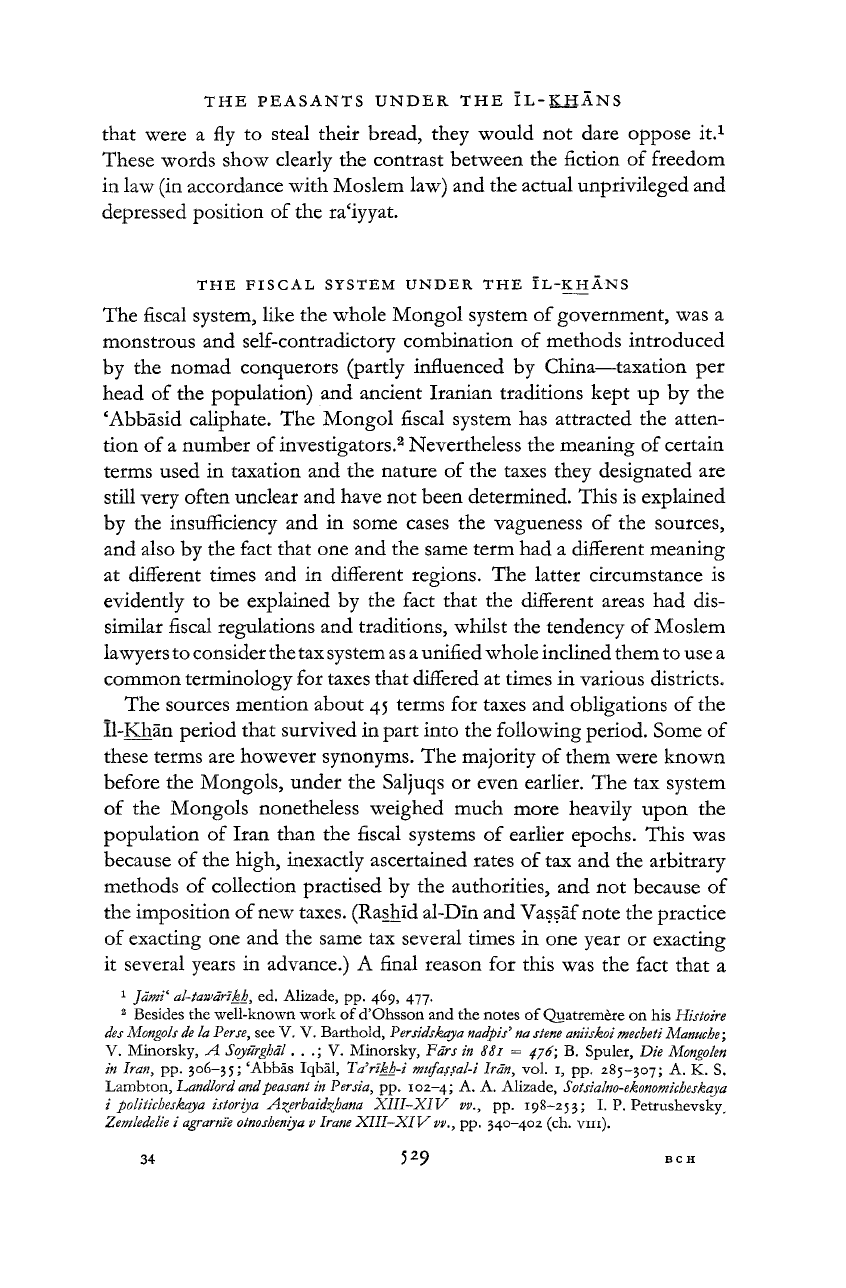
THE PEASANTS UNDER THE IL-KHANS
34
529
BC H
that were a fly to steal their bread, they would not dare oppose it.
1
These words show clearly the contrast between the fiction of freedom
in law (in accordance with Moslem law) and the actual unprivileged and
depressed position of the ra'iyyat.
THE FISCAL SYSTEM UNDER THE IL-KHANS
The fiscal system, like the whole Mongol system of government, was a
monstrous and self-contradictory combination of methods introduced
by the nomad conquerors (partly influenced by China—taxation per
head of the population) and ancient Iranian traditions kept up by the
'Abbasid caliphate. The Mongol fiscal system has attracted the atten-
tion of a number of investigators.
2
Nevertheless the meaning of certain
terms used in taxation and the nature of the taxes they designated are
still very often unclear and have not been determined. This is explained
by the insufficiency and in some cases the vagueness of the sources,
and also by the fact that one and the same term had a different meaning
at different times and in different regions. The latter circumstance is
evidently to be explained by the fact that the different areas had dis-
similar fiscal regulations and traditions, whilst the tendency of Moslem
lawyers to consider the tax system as a unified whole inclined them to use a
common terminology for taxes that differed at times in various districts.
The sources mention about 45 terms for taxes and obligations of the
Il-Khan period that survived in part into the following period. Some of
these terms are however synonyms. The majority of them were known
before the Mongols, under the Saljuqs or even earlier. The tax system
of the Mongols nonetheless weighed much more heavily upon the
population of Iran than the fiscal systems of earlier epochs. This was
because of the high, inexactly ascertained rates of tax and the arbitrary
methods of collection practised by the authorities, and not because of
the imposition of new taxes. (Rashid al-Din and Vassaf note the practice
of exacting one and the same tax several times in one year or exacting
it several years in advance.) A final reason for this was the fact that a
1
J ami' al-tawdrtkh, ed. Alizade, pp. 469, 477.
2
Besides the well-known work of d'Ohsson and the notes of Quatremere on his Histoire
des Mongols de
la Perse, see V. V. Barthold,
Persidskaya
nadpis'
na stene
aniiskoi
mecheti
Manuche;
V. Minorsky, A Soyurghal. . .; V. Minorsky, Fdrs in 881 = 4J6; B. Spuler, Die
Mongolen
in Iran, pp. 306-35; 'Abbas Iqbal, Tarikh-i mufassal-i Iran, vol. 1, pp. 285-307; A. K. S.
Lambton, Landlord and peasant in Persia, pp. 102-4; A. A. Alizade,
Sotsialno-ekonomicbeskaya
i politicheskaya is tor iy a A^erbaid^fjana XIII-XIV vv., pp. 198-253; I. P. Petrushevsky,
Zemledelie
i
agrarnie otnosbeniya
v
Irane
XIII-XIV
vv.,
pp. 340-402 (ch. vui).
